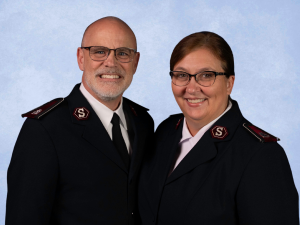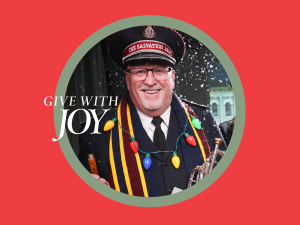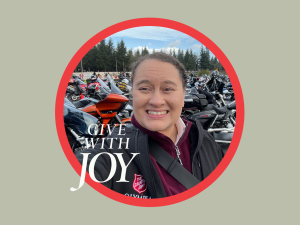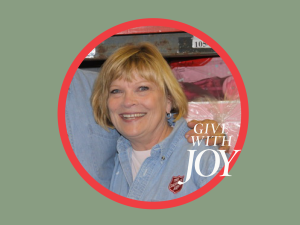As summer winds down and we feel that familiar pull toward the hustle of fall schedules, we’re going to do something countercultural together.
Instead of diving headfirst into the busyness that September always seems to bring, we’re taking a moment to pause, breathe, and explore what it means to live at a pace that honors both our humanity and our calling to serve others well.
This is our “Slowing Down” series, and it comes at the perfect time. Maybe you’re like me—you love summer’s slightly slower rhythms, those longer evenings and even unhurried mornings, and you’re dreading the return to packed calendars and endless to-do lists. Or maybe you’ve been running at full speed all year and you’re realizing that the pace you’re keeping isn’t just unsustainable—it’s actually making you less effective at the work you care about most.
We know slowing down isn’t about doing less good in the world. It’s about doing good in a way that’s sustainable, joyful and rooted in the rhythms God designed for human flourishing.
So over the next five episodes, we’ll hear from incredible voices who will take us on a journey from permission to transformation.
Each of these conversations will challenge the cultural lie that our worth is measured by our productivity, and invite us into what Jesus calls “unforced rhythms of grace.” Because when we learn to live at the pace of love rather than the pace of fear, we don’t accomplish less—we accomplish what matters most.
And there’s no better person to begin this journey with than our guest today: Alan Fadling, author of “A Year of Slowing Down: Daily Devotions for Unhurried Living.“
Alan brings a unique combination of vulnerability and authority to this conversation. He describes himself as a “recovering speed addict”—someone who knows firsthand the cost of living at an unsustainable pace. But he’s also the president and founder of Unhurried Living Inc., and for over 30 years, he’s been teaching leaders and communities how to follow what he calls “Jesus’ rhythms of work and rest.”
Alan holds a master of divinity from Fuller Theological Seminary and works internationally with organizations like Saddleback Church and InterVarsity Christian Fellowship. He’s the award-winning author of several books, including “An Unhurried Life,” which won a Christianity Today Award of Merit in spirituality. He’s also a trained spiritual director, bringing deep wisdom about how hurry inhibits our spiritual formation.
But what makes Alan’s voice so compelling is that he doesn’t just preach slowing down—he’s learned to live it. His latest book, “A Year of Slowing Down,” offers 365 daily devotions designed to help us center our days around God’s loving presence. Each day begins with Scripture, followed by a short reading and reflection question—what Alan calls “five-minute daily retreats.”
If you’ve ever felt guilty about slowing down when there’s so much need in the world, if you’ve wondered whether taking time for rest means you care less about important causes, or if you simply want to understand how following Jesus’ rhythms can enhance rather than diminish your ability to serve others—this conversation will give you the biblical foundation and practical wisdom you need.
Alan helps us see that unhurried living isn’t spiritual laziness—it’s faithful discipleship. And that might just change everything about how we approach both our relationship with God and our service to others.
Show highlights include:
- Why productivity is not the measure of worth or success
- The cost of hurry—and how presence is the most essential gift we give others
- How rest is not the end point of work but the starting point
- The difference between serving from overflow vs. serving from scarcity
- Practical disciplines of silence, solitude and Sabbath to cultivate unhurried living
- What it means to say love isn’t rushed—and how slowing down helps us see and respond to real needs
- How unhurried living equips us to serve others for the long haul
Listen and subscribe to the Do Gooders Podcast now. Below is a transcript of the episode, edited for readability. For more information on the people and ideas in the episode, see the links at the bottom of this post.
* * *
Christin Thieme: When you are having a conversation with someone, can they actually feel that you live differently? Is there something tangible about your presence that reflects this unhurried way that you’ve been cultivating now for many years?
Alan Fadling: I mean, one answer would be you’d probably have to ask them. My other answer would be I hope so. It’s what my wife and I… We always say is we’re trying to learn how to live at the pace of the kingdom. And the kingdom of God is a kingdom of peace. It’s a kingdom of remarkable love. It’s a kingdom that is patient and gentle, and I think all of those go very well with a somewhat slower inner life, less anxious inner life, so that’s at least who we are trying to be.
Christin Thieme: It may not always have been that way necessarily, though. I know in your book, “An Unhurried Life,” you begin with the confession, “I am a recovering speed addict.” So when did rock bottom happen for you? What convinced you that speed was actually costing you more than you realized?
Alan Fadling: Yeah, so this journey of trying to be more unhurried has been a while. I’m in my sixties now, but it was in my late twenties as a full-time pastor to college students in a southern California church and a full-time seminarian working on a master’s degree that I began to burn out. I would come home from long days of studies and ministry and work and I would go to our guest room, lay on the couch and stare at the ceiling in the dark. Not a great way to live. That was the cost.
That was at least part of the cost of my very hurried orientation, and so God was kind enough then to bring some friends, really some mentors who were 10, 20, maybe 25 years ahead of me on the journey and they were living at a different pace. They were just as engaged, just as involved in doing good, but they weren’t becoming exhausted trying to do it, and I was grateful for their encouragement and their mentoring and that changed everything for the last 30 or 35 years.
Christin Thieme: I know in that time you’ve spent really teaching that productivity and success are not meant to be the chief end, but rather living at the pace that our true self longs to live. Can you talk a little about what is that pace that we long to live and why is it so hard for those of us especially who want to do good? Why is it harder for us to slow that down?
Alan Fadling: There’s so many reasons. I think our souls were made to live at the pace of presence, but our culture lives at the pace of get more done. We imagine that the good that we do is mostly something out of us, outside of us that we do for somebody else, but the good that we do starts in us. The goodness that we share with people, the goodness that inspires us to express love or to provide care or whatever it is, starts in us. It starts with God’s goodness, which then fills us, which paces us and then expresses itself.
There’s so many images in the Scriptures about Jesus saying, “The water you’ve given me, you’re going to have to give it to me again. You’ll get thirsty again. The water I give, it’ll become like a spring inside of you that pours out toward eternal life.” There’s something that God wants to do in us that’s filling and then overflowing. There’s a difference between doing good from a place of overflow and doing good from the last three drops in the bottom of my cup. That’s what I’ve been learning in my own attempt to live well in the world God’s put me in.
Christin Thieme: You mentioned the word presence and in “A Year of Slowing Down,” you structured daily devotions around what you call God’s loving presence. Why is presence so central to unhurried living?
Alan Fadling: Yeah, I think the main reason is that presence is who God is. Presence, in a sense, is who I am. I cannot serve another person if I’m not present to them. The good that I do is not a transaction; it’s a relationship.
I meet another person. I’m there. I give them my attention. I listen to their words. I listen to their lives. I listen to their hearts. I can’t do any of those things if I’m absent. The problem for me has been that hurry makes me more absent more often. When I’m in an interior hurry, I can be with somebody face to face, and yet they feel like I’m about 80% gone because I’m already thinking about the next thing on my list of good things to do. So to me, it’s impossible to do good if you’re not able to be present. That’s the most essentially good thing we give to others. And again, I learned that because I learned to practice the presence of God who’s always with me, always the God who is good, always the God who’s doing good in me and then doing good through me.
Christin Thieme: You read about following Jesus’s rhythms of work and rest, and when we look at Jesus’s ministry, I think we can see someone who was incredibly productive on the one hand. So how do we reconcile his effectiveness with also his unhurried approach?
Alan Fadling: Yeah. This I think gets at one of the assumptions that I think we really do live within our North American context. At least that’s my context. We assume that busy is productive. We think that’s an equation. But I think you and I both can think of days when we’ve been frantically busy and wondered at the end of that day if we’d done anything that was meaningful. So one of the things I want to say is the reason I think Jesus in only three and a half years of active work accomplished more than I have in more than 40 years of adult ministry is that his going a bit slower enabled him to know what was on the Father’s heart in any given moment. He knew the good thing among the hundreds of good things he could have done, he knew the good thing that would be just right in that moment with that person in that setting.
What I want to say is that when I slow down, I’m more discerning. When I slow down, I see things better. I see people better. I’m more likely to see their need and meet them there rather than bring my program, which I’d already had in mind before I showed up. So again, I think the slowing down, the reason that’s more productive is I’m more likely to do the good things that matter the most when I’m a little slower inside. When I’m frantic inside, anxious inside or hurried inside, I’m more likely to just do a busy thing to get something done, but it may or may not meet that person or meet that situation as well as it could.
Christin Thieme: What’s the cost of not doing that? I mean, in your years of ministry and you’ve worked with many large churches, large organizations, what do you see happening, especially to ministry leaders who maybe operate at more of an unsustainable speed?
Alan Fadling: Well, I think when we look at so many public figures, leaders in various Christian contexts who they’ve run out of gas or they’ve made some very poor decisions, which sort of took them out of the doing good that they had been doing. I think there’s all kinds of dynamics that… I would like, for example, I’d like to be the kind of person who when I move into my seventies and then someday into my eighties, I’m still doing good. I’m doing it with joy. I’m doing it from peace. There’s a kind of unsustainability in the kind of pacing I see in the lives of some leaders. They’re living their lives and doing their work as though it were a sprint and our lives aren’t. Our lives are a wonderful long journey.
That’s mainly not about the things I do, but mostly about who I am in God. And then I’m a person who of course does things. I just think a lot of the painful stories we’re seeing and hearing among those whose intention in churches, in nonprofits, in other settings to do good, but their best intentions have not been realized. I think a lot of that is because of sometimes at least the unfortunate pacing at which they’re living, they imagine that what they do is who they are, and that’s a treadmill that just keeps running faster and faster.
Christin Thieme: Yeah. One you can’t ever outrun too.
Alan Fadling: Nope.
Christin Thieme: You make a powerful distinction. You say that, “Rest is not a place I collapse into when I’ve finally done enough work. It’s the starting place.” Can you unpack a little what it means to be begin in rest rather than end in rest, particularly speaking?
Alan Fadling: So it makes me think of some ideas from the Old Testament Scriptures. For example, the idea of a Sabbath now in the story of creation, Sabbath is day seven. It’s the last of the days. But the rabbis would often say, though it’s last in creation, it’s first in intention. One of the ways to illustrate that is that when you think of the human story in creation, our first full day is a Sabbath day. It’s not a work day. We’re created on day six. Not much to do there other than be created day seven, God enjoys a day of rest and fellowship and communion with us. That’s the starting point, and then we enter into work.
The Jewish way of thinking of a day is another illustration of this. For us, the day starts when my day to day, when the alarm went off at X o’clock in the morning. In the Jewish mind, the day starts as the sun is setting. So the Jewish way of thinking of a day ironically is half a day of rest followed by half a day of work. Our way of thinking of a day is half a day of work ended by a collapsing into half a day of rest. I just think rest is like fertile soil where good work grows.
When I am well rested, and by that I don’t just mean getting eight hours of sleep. That’s maybe a little part of it, but I’m talking more about that inner rest, the kind of rest when Jesus says, “Are you weary? Are you burdened? Come to me. Learn from me. Take my yoke. I’ll teach you how to rest.” That kind of inner soul rest. When I work from that place, I find myself more creative, more insightful, more wise, and I have far more capacity to do the things I’d like to do and to do them well. So that maybe is the best way. I just say good work grows in the soil of good rest. I really have come to believe that experientially.
Christin Thieme: Yeah. You frame the book as God’s call rather than just good self-care advice and you say, “Will you accept God’s call to welcome a year of slowing down?” For those who haven’t seen the book yet, how would you describe it and why was it framed around a daily devotional for a year?
Alan Fadling: Yeah. Well, I had written “An Unhurried Life,” and then I had written “An Unhurried Leader,” both of which are more chapter books. The advantage of the devotional, it’s formational by design. If you engage it the way it’s written, you’re going to take a little step every day for a year. Now, in this case, it’s six days a week. You get a break one day. But for a year you’re going to be thinking about this. There are questions that invite you to think a little deeper. You’re invited to take a little step. In a sense, a devotional at its very best can be a journey.
And so my hope when I proposed the book and then as I wrote it, was to invite people into a journey of seeing the genius of Jesus’s unhurried way, that he always had time for prayer. No matter how big the crowds got, he always had time for the stranger on the side of the road, even though he was on his way to something they’d all planned to do. There was this remarkable capacity in him, like I said, to know what it was that was on the Father’s heart, what it was that the Father was saying or what it was that the Father was doing. He was so tuned in and in touch with the Father because of his pacing, he was able to live this wonderfully and this beautifully loving life. So my hope in writing this devotional was to invite people to sink into this. About half of the day’s entries are gospel-based, so they’re very Jesus-focused. He’s our best model for this unhurried kingdom way of life and of work.
Christin Thieme: You mentioned in it that, “When we’re hurried, we run past much that God is trying to show us, give us, lead us into.” Can you share an example of what we miss when we’re moving too fast?
Alan Fadling: As I think about that, I am a planner. I love scheduling my days. Every night I take a moment prayerfully to think about the coming day. I thought about our conversation today. I thought about a number of other things I knew I’d want to work on, but one of my mentors used to say, “Plan well and then hold your plans loosely,” because so many of the good things I think God invites us to do are often not on our calendar when the day begins, and if you’re going too fast, you’ll miss them.
So many of the best ideas I’ve had were not the result of my frantic hard work, brainstorming an idea. So many of the solutions to challenges I was facing were not because I got a bunch of people together and we solved it. It’s like God sort of gave that insight as a gift and then we stepped into it. So there’s so many good things that you just can’t exactly plan for, but you can be ready to receive. And again, receptivity is a little bit slower than some of the hyperactive modes that we sometimes find ourselves in when we’re serving.
Christin Thieme: Yeah. Like you said, we live in an urgent world and there are real crises and injustices and so on and so forth happening all around us. But I know you write that love isn’t rushed. So how do we balance that call to urgent action? The things that really do need to be done with this call to unhurried love?
Alan Fadling: It makes me think of Jesus’s story of the Good Samaritan. I think that love can be quick, but I don’t think love does well in a hurry. Maybe that’s a distinction I can make.
The story of the Good Samaritan in part is the unexpected person being the loving one in the Samaritan. The Samaritan’s not supposed to be the good guy and a story being told to a Jewish community, but he’s the one who stops when no one else will. He’s the one who expresses care when the others have gone on to the important things they have on their calendars. He puts this broken man on his donkey and takes him to an inn and stays there. And then arranges for him to stay awhile. That’s unhurried. He had a plan in his mind, surely as that day began, that did not involve somebody he’d find on the side of the road. So maybe that’s what I mean. We’re not so attached to our agendas that we can’t slow down and respond to the opportunity that crosses our path. An opportunity that we didn’t know was going to. That may be how I see the unhurried nature of love.
Christin Thieme: Yeah. You’ve been doing this work for over 30 years now. What have you learned about your own rhythms and limits that you wish you’d known when you started?
Alan Fadling: It’s interesting, just before you and I got on this conversation, I was speaking to a pastor, a young thirty-something pastor, and we were talking about some of these things actually. The thing actually, I would say, is caring for your soul and caring for it well may be one of the most important things you do for the sake of others.
I think we’re tempted to imagine that soul care is a semi-selfish, semi-self-serving activity, and that what you really should do is just spend every minute you can helping others. The great command is love God and love your neighbor as yourself, but the as yourself part is not a throwaway. We will tend to treat others the way we treat ourselves. If we’re harsh with ourselves, we’ll tend to be harsh with others. If we’re frantically busy in our own life’s orientation, we’ll bring that expectation to others too. So if I’d like to love others well, I need to let myself be loved well, so that I’ll have that to give in the opportunities that cross my path. That’s something I wish I knew more of. As leaders, as servants, as ministers, I think we way overvalue our frantic activity and we undervalue our presence. Who we are when we do the good things we do makes an immense amount of difference.
Mother Teresa doing something good looks a little different than a frantically hurried North American looks doing the exact same good thing. I would rather be a kind of Mother Teresa person. And the reason she could do what she did at the level she did it is she had a remarkable rhythm of daily, weekly, monthly, and annual rhythms where she would step back from the field while she was doing good to meet with God, to be with her community, to be restored, to be renewed, to be refreshed, to bring that back to the people that she served. So that may be the thing I would love for a younger me to have known. Care well for your soul. Doing good at the cost of your soul does not do good. That I think is really critical.
Christin Thieme: A lot of us can relate to this feeling of that internal anxiety of busyness feeling. We’ve all experienced it at some point or another. So for those listening who feel that feeling but want to come closer to this unhurried living, what’s a simple practice that you would suggest starting with?
Alan Fadling: So I think when we talk, for example about spiritual disciplines, sometimes, especially when I was a younger leader, I would tend to think of spiritual disciplines as a list of things I do in relationship to God. So maybe I read the Scriptures, maybe I pray, maybe I am of service. Maybe I fast. I don’t know. Maybe I’m alone. There’s a number of spiritual practices. The longer I go, the more I like to think, and this is something Dallas Willard did in the way he categorized, he categorized spiritual practices as some of them practices of engagement, action, and some of them practices of disengagement or even abstinence. There’s a kind of spaciousness in spiritual practices like solitude or silence or stillness or Sabbath. And one of the things I would say is find some of those sorts of disciplines that work for you and that fit you. It will feel like you’re not doing anything. It will feel like therefore you’re not doing good. But one of the critical challenges is to know that I do good from who I am. I don’t do good to prove who I am.
That may end up sounding like semantics, but it’s an immensely different thing when I go from a place of security to meet someone else in need, as compared to going from a place of insecurity to meet someone else in need. I have more to bring from a place of security, a place of knowing myself, beloved of God, than when I go do good to try and prove I’m good, to prove I’m okay, to prove I’m worthwhile. Then I’m sort of serving from a deficit that becomes really exhausting and profoundly anxiety producing. Learning that what I have in abundance, I can then share, the Psalm 23 language, “My cup overflows,” that’s the kind of life I want to live. I want the good that I do to come out of a full cup. It’s so full I can’t even hold all of it, and so overflow. That’s what I’m trying to do.
Alan Fadling: And so to your question, find those rhythms of stepping back where God can fill you, where God can meet you, God can do good in you and for you because that good, you’ll then be able to bring into the world where he sends you.
Christin Thieme: We’re just starting out on this series on slowing down. So this is a good place to start. And thinking about unhurried living is actually faithful discipleship, not laziness or anything else, that it actually is so much a part of our foundation. So thank you for sharing with us. I’m wondering, as a last question, I often like to ask people, what is giving you hope right now?
Alan Fadling: I think when I look at the newsfeed and current events, it’s hard to feel hopeful. When I look at the gospels, when I look at the life of Jesus, when I look at who God is, I feel much, much more hopeful. I see a Jesus who promises he’ll always be with us. I see a God who calls himself the God of hope. So in some ways it’s been for me a matter of what is it that I’m practicing? Am I practicing the presence of my news feeds and social media and current events? I don’t want to be ignorant, but if I’m practicing the presence of a God of hope, I bring that to what feels sometimes like a hopeless world. That’s been helping me.
Additional resources:
- If you are one of the hopefuls, get on the list for the Do Good Digest, our free 3-minute weekly email newsletter used by more than 20,000 hopefuls like you for a quick pick-me-up in a busy day.
- If you are enjoying this show and want to support it, leave a rating and review wherever you listen to help new listeners hit play for the first time with more confidence.
- If you want to help The Salvation Army serve more than 27 million Americans in need each year, give today. Your gift of money, goods or time helps The Salvation Army do good all year in your community.
Listen and subscribe to the Do Gooders Podcast now.












